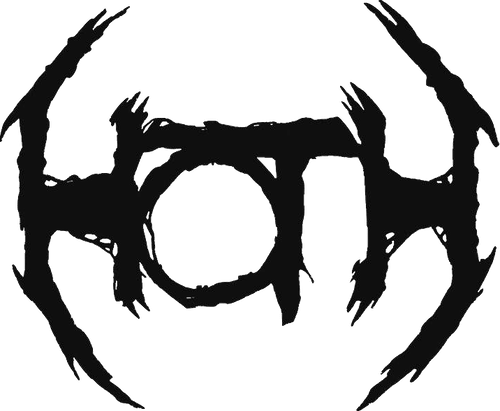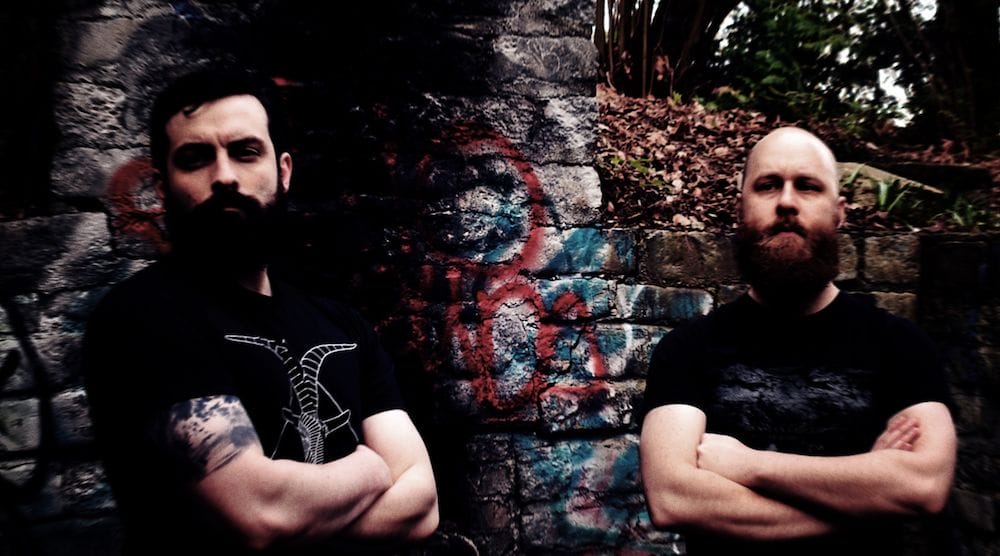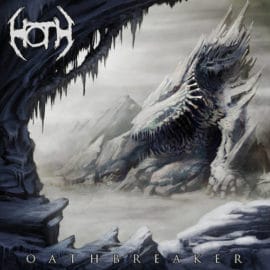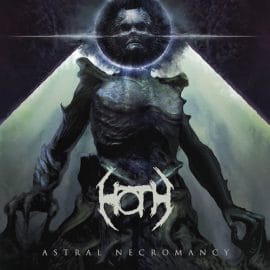In 2014, the American melodic black metallers HOTH released „Oathbreaker“, an amazing concept record inspired by the lore of Star Wars. The follow-up „Astral Necromancy“ shows a new side of the duo: The noticably darker and more straightforward songs don’t form a continuing storyline, even though the record also tells a story. In the following interview you can learn more about the other differences between „Oathbreaker“ and its successor, the distinct style of HOTH as well as the reason for them not doing live-shows.

Greetings! Thank you for taking the time for this interview. How are you feeling?
Thanks for having us! Things are going well! We had a big year with the album release. It has been nice to finally show off what we’ve been working on for the past four years. Overall 2018, if nothing else, has been a great year for heavy music.
In HOTH you basically play melodic black metal, but your style is quite recognizable. What aspects do you think are the most remarkbale of your own sound?
Writing for HOTH, we really try to have thoughtful melodies – not just earworms, but something that is well-constructed. We also try to have vocals that are comprehensible, we try to enunciate words, so that while screamed, you can still follow the lyrical story we are telling. I wouldn’t say we are reinventing the wheel with our style, but we are trying to create something new with the goal of making the kind of music we’d want to listen to.
As your band name suggests, you originally referred to the Star Wars universe in your lyrics. In the meantime, however, it is no longer so prevalent. Would you say you have outgrown that or are there still references to be found in it?
HOTH being a planet of ice, snow, and cold makes for the perfect imagery for a black metal band, wouldn’t you say? I wouldn’t say we’ve outgrown Star Wars, but we have definitely moved past that for lyrical inspiration. We have other ideas and interests that we want to express musically. Any references you may notice are a testament to the mythological nature of the Star Wars stories, wherein you find stock characters, and timeless tales.
Your lyrics are still revolving around sci-fi themes. What do you think of black metal bands that sing strictly about their convictions, their (non-existent) beliefs or other more serious concepts?
Metal is theatrical, and black metal even moreso. I wouldn’t say that singing about Satan is any more or less serious than crafting lyrical sagas rooted in fantasy or science fiction. There are lots of places to take lyrical inspiration, and I welcome a diversity of black metal bands, it means more good music for everyone.
Do you generally view music as mere entertainment or can it also be something more in your opinion?
Music is entertainment, at a very basic level, but it is so much more than that. Music can hold spiritual energy. Music is a fine art. Music is an artist‘s expression or opinion. In my opinion music is an incredible art form and an incredible medium for expression. Whether or not someone finds our artistic creations „entertaining“ is completely secondary to the primary purpose of expression.
If you could make music your main job, would you do it?
If I had to make music for other people, based on their criteria, probably not. But if I could just not work, and make my own music without being beholden to anyone else, absolutely.

For your current album „Astral Necromancy“ you have tried new techniques to develop your sound. Can you give us a concrete example of those new approaches?
Sure, we got new equipment including a new guitar, new MacBook, new audio plugins. Basically the platform the album was built on is completely new equipment. Early demos of „Astral Necromancy“ were all made with the same equipment from „Oathbreaker“ and we felt we needed to push onwards and better ourselves.
We shelled out the money for some really professional mastering by Mika Jussila at Finnvox Studio.
We took a more critial approach to songwriting and questioned the purpose of each part of each song to really pare things down to only good parts. There are two or three demo tracks we never used on the album. Some songs were recorded multiple times to get things to sound exactly how we wanted.
I, for example, noticed the cold keyboards on „The Horrid Truth“ and the clean vocals on „Vengeance“ and „Journey Into The Eternal Winter“. Why did you choose these stylistic elements for these particular songs?
A lot of times when writing music, something will just feel right – for example, in „Journey Into The Eternal Winter“, a clean singing chorus just seemed to be the natural fit of what the song demanded at that point. We recorded a rough version, decided we liked the aesthetic and re-recorded it to the quality we wanted. The cold sounding keyboards are carefully calculated, as with HOTH we have always strived to try and create a cold atmosphere, and dialing the perfect keyboard patch is critical to that, while also not overdoing it.
„Ad Inane Precatio“ is an interlude with church-like choral singing. What is the purpose of this interlude in the context of the album?
Originally that track was concieved of as an intro, and was inspired by Gregorian chants and Icelandic hymns. Eventually it became an interlude because it fit better at that point in the album. A short choral piece catches the listener by surprise and also allows some respite to contemplate the aural journey they have embarked upon before being thrust back into it. We decided to make it a choral piece instead of something ambient with keyboards or sound effects because it went well with our themes of a space necromancer studying arcane and forbidden lore in an effort to achieve immortality at any cost.
In general, the songs seem to be a bit more compact than those on the predecessor. Did you consciously take care not to digress too much?
Absolutely. We wanted to trim as much fat off every song. We wanted each one to feel lean and each part to have a purpose. We didn’t want meandering segments of songs devoid of meaning.
If you could play just one song from your new record to someone to give them an impression, which one would you choose and why?
„The Void Between The Stars“ because it has the most dynamic composition and is a personal favorite.
 While „Oathbreaker“ told a continuous story, the atmosphere on „Astral Necromancy“ is more or less on a constant level. Why is that so?
While „Oathbreaker“ told a continuous story, the atmosphere on „Astral Necromancy“ is more or less on a constant level. Why is that so?
It was interesting doing a linear story as a concept album. But it put certain writing constraints on us that we weren’t entirely happy with. Having a „themed“ album, but without a linear timeline to follow granted us immense freedom to explore new ideas. „Astral Necromancy“ is supposed to evoke a feeling of timelessness that could be happening anywhere at anytime in the cosmos.
I get the impression that in some tracks you use more characteristic black metal aesthetics. Lyrically, for example, on „Journey Into The Eternal Winter“ and musically I would draw some comparisons to Immortal. Would you agree with that, and if so, why is that so?
There are some similarities. „Journey Into The Eternal Winter“ utilizes a lot of icey, snowy, cold imagery, which feels right at home next to songs off „At The Heart Of Winter“. But I think the lyrical imagery is where the similarity ends. The song is about coming to the end of all things, all life, all existence, in a frozen wasteland. The lyrics are partially inspired by Kristian Wåhlin’s artwork for Wintersun’s self-titled debut album.
Your albums are always of a quite high production quality. Do you think a black metal-typical low-fi production wouldn’t fit your music?
While I am a fan of the black metal lo-fi aesthetic a lot of the time, I do think HOTH really expresses our artistic intent best with a high production quality. We feel we’ve hit a good balance and I don’t think we’d want things to sound too much more polished.
Do you have the impression that you could acquire more fans through your new album? And does that matter to you?
We could definitely get more fans because of the new album. It is always nice to know that people enjoy the music that you create. Fans who buy the album support us and enable us to make more music in the future. That being said, no, making new fans, or even keeping old ones is not important. We are making this music for ourselves, for our own reasons, and we are sharing it with anyone who will listen. We are not beholden to others just as no one is obligated to listen to our art.
 The artwork shows a sinister, humanoid figure in space. Could this be the protagonist of the album? What can you tell us about this character?
The artwork shows a sinister, humanoid figure in space. Could this be the protagonist of the album? What can you tell us about this character?
The cover artist, Dusty Peterson, might have his own narrative for this character. For us, we’ve taken to calling him „the astral necromancer“ so I suppose, in a way, yes, he is the central character of the album. The goal of the artwork is not to show a specific moment of the album’s story, but rather evoke a feeling in the listener when looking upon it. We wanted the art to capture the darkness our album contains. We want to invite the listener decide what it represents, and to us it’s a space necromancer, an unknown eternal being trapped in a timeless void, maybe living, maybe dead, maybe in the past, maybe in the distant future, but to you, who’s to say for certain. It is an intentional mystery, but it gives the listener some context to what the music is about.
The picture was again created by Dusty Peterson. Why did you ask him again and are you planning to regularly work with him in the future?
Dusty created our artwork for our 2014 album „Oathbreaker“ and did a phenomenal job, so we ended up asking him to do the artwork for „Astral Necromancy“ as well. Dusty was very easy to work with, we just told him we wanted something that felt „dark“ and „cold“ and we gave him some early demos and all the lyrics we had so far, which was really only two or three songs, and we gave him complete artistic freedom. Artists always thrive best when you give them freedom and the results show. We would absolutely work with Dusty again in the future. In fact, he has even done a (now sold out) t-shirt design for us in addition to two album covers.
This time you have released your record through a label for the first time. Why not earlier and how did you end up at Epicurus Records?
Epicurus Records is a label we founded ourselves to put out our various musical projects, and the projects of others who are local to us in the Seattle area whose music we believe in. All of our previous physical releases were done via Epicurus. Through Epicurus we have complete artistic freedom to create the music we want on our own timelines. So far it has worked out quite well for us, though we lack the distribution and promotion a large label would have, those things are far less important in the modern age of music with the internet and word of mouth having so much more power.
HOTH has been a pure studio project so far, hasn’t it? Do you consider also playing live one day?
Yes, HOTH has always been a studio project. It might be fun to play live, however we have no plans to do so. The worst thing that could ever happen to HOTH is putting on a live show that doesn’t live up to the quality of music on our albums. If we ever did it, we’d want it to be perfect.
Now we will go on with our traditional Metal1.info-Brainstorming. What comes to mind while reading the following terms?
The Black Dahlia Murder: A bunch of good dudes who really like „Slaughter Of The Soul“.
Solo – A Star Wars Story: A fun adventure film – in space.
Internet memes: Socialism
Extraterrestrial life: Fermi paradox or will probably manifest as artificial intelligence.
Video games: Video games are fun. Gamers are not.
Politics in music: Unavoidable. An artist always puts a bit of themself into their work.
It seems we have now reached the end. Thanks again for your answers. The last words are yours:
Thanks a lot for taking the time to ask us about our music. It is something we are very passionate about. I always enjoy an interview where we get questions we haven’t ever been asked before, it is refreshing. Our final words: support local metal: go find an album on Bandcamp and buy it today! Go see a local band play this week!
Dieses Interview wurde per E-Mail geführt.
Zur besseren Lesbarkeit wurden Smilies ersetzt.
